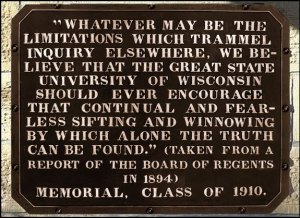Herb Strentz: Republican bills to ban tenure at Iowa’s state universities have moved forward in both chambers. Governor Kim Reynolds isn’t concerned. -promoted by Laura Belin
When one surveys the efforts of the Iowa legislature and Governor Kim Reynolds this legislative session, the words “striving for equality” may not come to mind — what with efforts to undercut public education, sabotage access to abortion, punish the LGBTQ community and enact other vindictive measures, as noted by Kathie Obradovich in Iowa Capital Dispatch.
“Equality” does come to mind, however, albeit in an oddball way — the efforts of some legislators to bring Iowans down to their level of what Iowa should be about.
That may be a harsh way to look at Iowa law-making, but it is merited by House File 49 and Senate File 41, proposals to make Iowa the first state in the nation to outlaw tenure at its public universities, in our case Iowa State University, the University of Iowa, and the University of Northern Iowa.
Briefly put, the tenure process guarantees employment to a full-time university faculty member after the professor proves his or her worth in the eyes of colleagues and maybe peers at other institutions after about six years of teaching, research, and public service. That’s quite an investment for a university to make, but it is also needed protection for the exercise of academic freedom and the advancement of knowledge. (Tenure, however, cannot protect a faculty member if a discipline is dropped from the curriculum, awful financial woes hit the institution, or in cases of incompetence or moral depravity.)
Tenure has occasionally been threatened by measures like the new Republican bills, or interest groups, businesses, and politicians who retaliate when research or classroom instruction threaten their cherished or economic interests.
The conflicts of long ago, like whether the theory evolution should be taught in public schools, are conflicts today, too, and will be in the future.
Dr. Jerald Schnoor, co-director of the University of Iowa’s Center for Global and Regional Environmental Research, put it this way in an email:
Tenure is as important now as it ever has been. Faculty must be able to pursue areas of research and scholarship wherever their findings take them without threats of reprisal. Sometimes the results are controversial but that is how we make progress through discovery and generation of new knowledge.
I sought comment from Schnoor because of a 2013 episode after he and Dr. Theresa Selfa, an associate professor at the State University of New York’s College of Environmental Science and Forestry, attended a biofuels energy symposium.
According to an article in Scientific American, Selfa said “biofuels are not an overwhelming win-win for rural communities.” She also noted the communities were often proud of their biofuel plants, despite the perceived impacts on the water supply, because “relative to the environmental impacts of other industries in the Midwest, […] ‘the ethanol industry seemed pretty benign.'”
“Seemed pretty benign” was not enough to mollify Bruce Rastetter, a member of the Iowa Board of Regents, a co-founder and former CEO of an ethanol operation, and a big contributor to then Governor Terry Branstad. Also upset was Monte Shaw, executive director of the Iowa Renewable Fuels Association. In an email to then University of Iowa president Sally Mason, Shaw only referred to Selfa as “an East Coast, Ivory Tower #@%@#@#$” and called Schnoor “an embarrassment” to the University. Rastetter characterized Schnoor, who is quite knowledgeable on ethanol issues, as “uninformed.”
Fortunately, faculty like Schnoor have tenure to protect them against such pressures, implied or direct.
While an anti-tenure proposal is not new to the legislature, this is the first time the idea has advanced through committees in both chambers, despite opposition that has breadth and depth. More than 30 professional organizations, associations, and agricultural interests are registered against it — including the Iowa Business and Industry Association, the Board of Regents, the Soybean, Pork Producers, Cattlemen’s and Poultry Associations, the Iowa Medical Society, the American Civil Liberties Union of Iowa, and others who value unfettered research and academic freedom.
Reynolds seems rather dismissive of business groups that fear House File 49 and similar regressive actions might make Iowa less attractive to new development. In an interview with O. Kay Henderson of Radio Iowa, Reynolds said she’d would not weigh in on such issues and that new businesses — including high tech ones — are coming to Iowa for financial reasons and let it go at that. “We have a low cost of doing business and, bottom line, math is math,” she said.
A different perspective was offered from Dr. William Barker, associate dean of for research and graduate programs, at the College of Agricultural and Life Sciences at the University of Wisconsin. Responding to an email query about threats to research, Barker mentioned an academic freedom case at UW more than 125 years ago. He said a report from the UW Board of Regents in the 1890s was so treasured that a sentence from the report is replicated in bronze and is in front of the Madison main campus administration building.
“We call it the ‘Sifting and Winnowing’ statement,” he emailed, “and it states,”
Whatever may be the limitations which trammel inquiry elsewhere, we believe that the great state University of Wisconsin ought to ever encourage that fearless and continual sifting and winnowing by which alone the truth may be found. (emphasis added)
Our legislature and governor to the contrary, we should help keep ISU, Iowa, and UNI so fearless.
“Sifting and Winnowing” plaque from Bascom Hall at the University of Wisconsin:



1 Comment
On IOWA PRESS tonight...
…it was hinted that this bill is really political saber-rattling that won’t become law. I hope that’s right. Even if true, it’s a stupid saber to rattle. Combined with the bathroom bill and others, the Iowa Legislature and Governor are sending signals about Iowa to the rest of the country. During a phone call to a relative in another state who has no ties to Iowa, she mentioned that she had seen on the news that Iowa’s governor was doing a poor job of managing covid. This is not the kind of fame we want.
PrairieFan Sat 20 Feb 2:46 AM